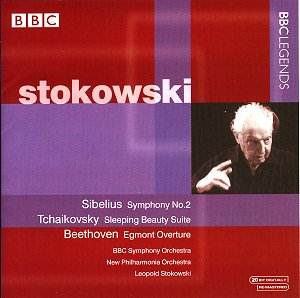Stokowski made his Henry Wood Proms debut on 23 July
1963. He must have made a good impression because when he asked to come
back William Glock agreed. Despite determined encouragement to include
Sibelius 7 in the 1964 roster Stokowski doggedly insisted on the Second
Symphony. He also resisted Glock's blandishments to include the Symphonie
Fantastique saying that people like Paray and Monteux conducted
it so much better. London remained secure among his affections. He died
there on 13 September 1977, the very day he was to begin recording sessions,
at the age of 95, for Rachmaninov's Second Symphony.
Stokowski knew the Sibelius Second Symphony inside
out. He conducted it first in 1912 in Philadelphia and his final concert
reading came in 1965 again with the Philadelphians. Stokowski in this
1964 reading sculpts and shapes every phrase with two results. Firstly
this is a reading to hear if you want your impressions of the work freshened
and to be surprised by details long 'hidden'. Secondly the indefinable
sense of flow, cohesion and logic suffers from diffusion; not disastrously
but it is noticeable. Idiosyncratic touches are legion starting with
the softened contouring of the rhythmic figure that opens the work.
As a whole the reading lacks the boiling exhilaration of Beecham's 1954
recording with the BBCSO or Barbirolli's 1965 recording with the RPO
(Chesky). It suffers trivially from coughs and shuffles and from mildly
cramped early FM mono sound. However it shivers with unpredictable life
and Stokowski can be relied upon to refine and redirect gestures, surprise
you with detailing: a self-effacing pass here, a softening there. For
example he shaves to a virtual sigh the Tamara shudders at 8.13
in the finale. Among modern studio recordings Maazel and Ashkenazy are
good. Further back in time so is Anthony Collins (Beulah originally
Decca). This BBC Legend disc is not a sole library version but certainly
a palate-enlivener for when you are jaded with laureate recordings.
This collection is not from the same concert nor even
the same orchestra. The Tchaikovsky suite is from the following year
- a studio session in the Kingsway Hall and from 1973 a stereo Egmont.
The orchestra is the New Philharmonia. It is typical of Stokowski that
he would add to the suite the microscopic Pas de six (Canari
qui chante) from the Prologue - a whirling glinting automaton
bird ‘flown’ before you can relish it fully. The auburn splendour and
opulence of the violins in the Waltz and Pas d'Action,
Pas de quatre (tr. 7, 8, 10) are memorable, the harp frolics
in the Pas d'Action forwardly decorated, the yearning explosive
romance well prepared, weighted and released in the Pas de Deux.
However this customised suite ends weakly with the stilted bombast
of the Apotheosis. The years seem to fall away with Stokowski's
Egmont although at the start there is some unsteadiness and distortion.
The sound is clearer but flawed at the treble end. The chesty string
tone is splendour itself (try at 3.40) and so is the scorch-harsh blurt
and blast of the brass fanfares at 6.42 and 6.49.
Stokowski fanciers now have another reason to check
their shelves for space.
Rob Barnett
